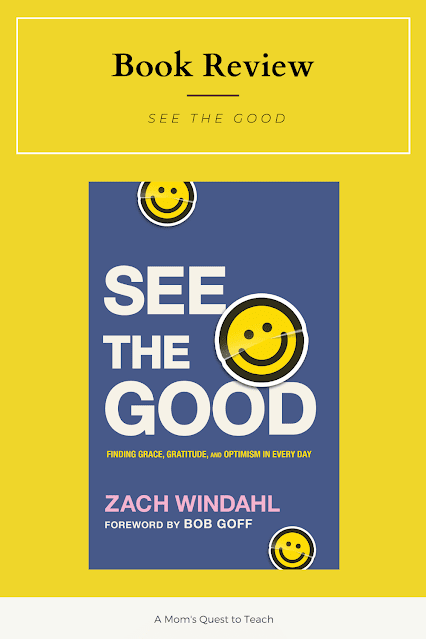I received a COMPLIMENTARY copy of this book from the publisher in exchange for my honest opinion. I was not required to write a positive review, nor was I compensated in any other way. This post contains affiliate links. For more information, please see my Terms of Use and Disclosure Policy page. Thank you.
About See the Good
"After almost losing his mother to cancer and wrestling with his own faith, Zach Windahl learned to take whatever life threw at him and chose to be joyful."
This inspirational paperback book is 234 pages long with twelve chapters and an appendix of 52 gratitude journal prompts. Windahl addresses his ideas in two parts: changing the way we see and how to live it out. In the first part, he discusses changes in technology, our roles on Earth, the differences between creation stories, celebrations, and what Jesus was really like (according to the author). In the second part, he offers several concrete examples through his own anecdotes. He shares several lighthearted stories in his quest to help you make changes in your personal life.
While See the Good offers a few specific and direct quotes from the Bible, the author often just shares stories without direct quotes. One example he gives about how we can change our perspective is from the Old Testament. In this example, he demonstrates that the worth of God's people changed as He brought them out of Egypt.
My Thoughts
I shared earlier that I feel that this book was not right for me. I went into reading and reviewing See the Good with an open mind, but after a few pages, I found myself writing down things I did not like or I did not agree with. But first, let me share what I did like about See the Good:
- The font choice and size made it very easy to read.
- As someone with limited time, I found the layout of the book (chapters, subheadings, etc.) made it easy to pick and read.
- Zach Windahl shares personal stories with no hesitation. By the end of the book, even if I didn't agree with him, I felt that I knew him and could speak with him in person.
- If you are looking for a way to think about your perspective of the world, See the Good asks a lot of questions which get you thinking.
- There are some clear, specific ways listed to help you change your perspective.
My problems with See the Good revolve around references to individuals, sources, and popular topics in the news and world. I do not necessarily agree with the perspective offered by the author on each subject, and I find some of the sources are not credible. These are my personal opinions, so others may not have the same issues as I did.
There was also one instance where I was amazed at a word choice. From the book: "You can quote Bible verses all day, but if you have a crap creative story, it doesn't matter" (95). While I understand that 'crap' is not the worst word ever written or spoken, I was taken aback by its use in a Christian book. As I wouldn't want my children using it, I don't want it in a Christian book I am reading, either.
Another point of difference is in regards to the author's perspective on pranks. He shares two pranks that he and his friends did when they were teenagers. I don't think pranks are very funny. They don't really fit into my sense of humor. The pranks mentioned were not really harmful, but I still don't think that Jesus would be laughing along with them, as the author suggested. Again, this all comes down to perspective.
In the end, did I find the book interesting and useful? Yes, See the Good made some good points. I think it would be helpful for other Christians who, while they need to look for more optimism, have a different outlook than me. I do believe that Windahl really wants his readers to change their perspective. As the back of the book states: "But choosing to put our focus on the good leads to profound benefits that come from seeing life as an amazing gift from the One who loves us best." Through the whole book, he directs us back to God and Jesus, and that is very important in any Christian inspirational book.




